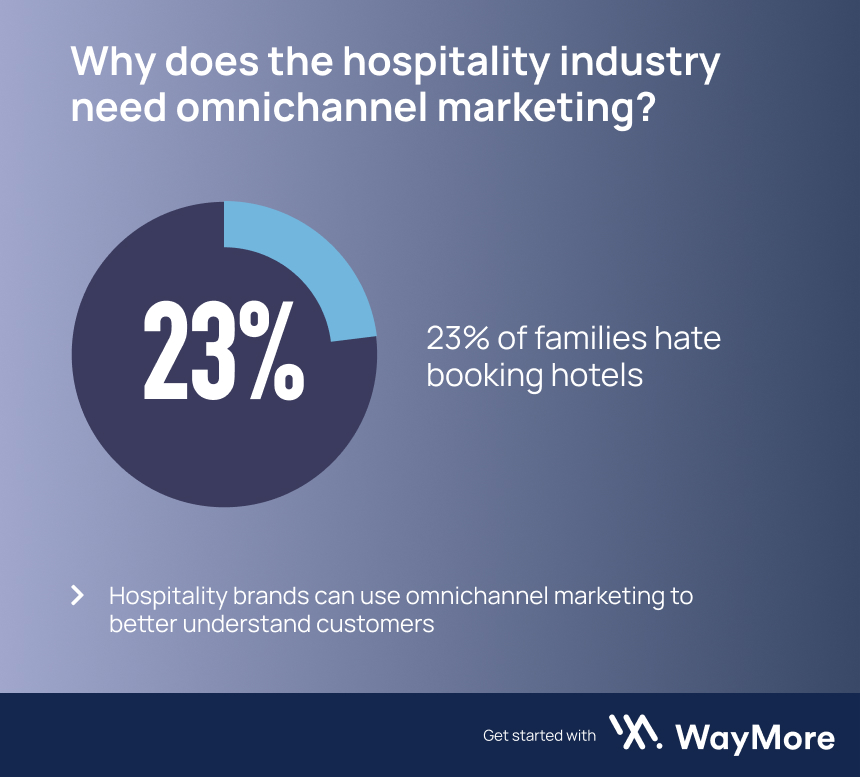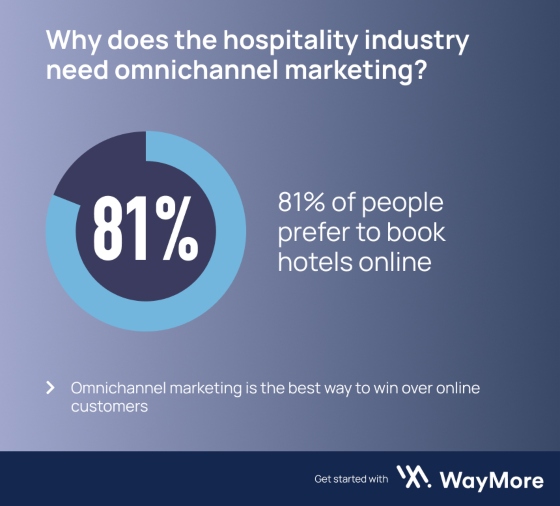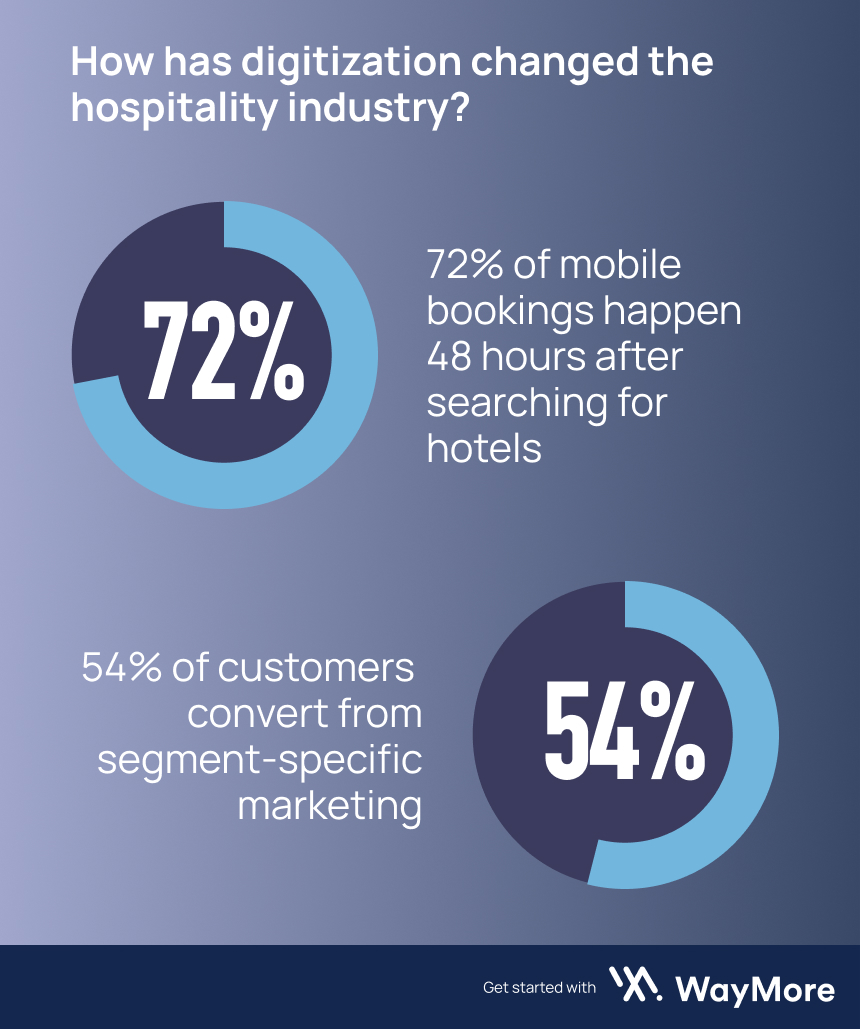Quick Links
Traveling is a popular leisure activity, but most consumers report strongly disliking looking for hotels. They find it tedious and difficult. As a hospitality business, you’ll need to make this process easier for
customers.
The best way is an omnichannel marketing strategy to provide an optimized customer experience. You want to approach users on their terms to maximize customer engagement and customer holding. Omnichannel marketing trends can help you achieve that.
Why does the hospitality industry need omnichannel marketing?
Up to 82% of US adults prefer booking their trips online. So the hospitality industry must consider the internet for their customer engagement strategy for real time solutions. The internet has already changed the hospitality industry.
Omnichannel marketing is the most effective way to take advantage of these trends to interact with your brand. Omnichannel approach provides the best experience to customers at every touchpoint: on the phone, social media, and live chat. Doing so optimizes their chances of winning consumers. Furthermore, Omnichannel hospitality marketing is the best way to boost customer engagement.
How has the internet changed the hospitality industry?
Before we can understand the importance of omnichannel marketing, we need to understand how the Internet affects the industry. The Internet significantly impacts marketing and customer expectations. Consider this when planning for omnichannel marketing.
1. Increase in online accommodation searches
72% of mobile bookings happen 48 hours after consumers search terms like ‘tonight’ and ‘today.’ Besides, many individuals tend to book their trips hastily. Users no longer call hotels or go through tour operators. People who search for hotels online and offline are more likely to book a room than those who use traditional channels like tour agencies.
What does this mean for the industry?
Hospitality businesses are already aware that most consumers holiday for 2 weeks in the summer. Booking hotels and tickets can also be a worrying experience for them. And then, the solution for most consumers is to rely on their phones. That makes these marketing campaigns more effective, especially in these times.
Hence consumers value online hotel booking for its ease. Hospitality businesses need an omnichannel strategy to provide consumers with a convenient customer journey to win the booking race
2. Influx of new customer segments
Customer segmentation is more advanced in hospitality today than ever. Some individuals travel on a budget; conversely, others opt for luxury travel. Meanwhile, there are those who travel for work—these Current digital nomads.
Many of these customer sections are new and only exist because of the Internet. What does this mean for the industry? Hospitality service suppliers need dynamic strategies.
They must tailor their content to each market segment. 54% of customers convert from segmented pushes.
The best way to target different sections is with an omnichannel customer experience. Hospitality businesses have the ability to utilize the most important channels and social media platforms. For each segment to provide a successful omnichannel experience.
For example, older travelers are more likely to respond to email marketing. And younger travelers prefer social media content.
3. Increase in demand for experienced-focused travel
Skift shows 52.8% of people prefer focused on experience travel. Social media and the internet have made people want to enjoy traveling more. This led to the rise of Airbnb and other popular economy services.
Millennials and Gen Z particularly prefer traveling with economic options. The sharing economy and the experience economy are the most popular among them.
The hospitality industry is increasingly moving towards experience marketing. Picture a luxury beachside resort in Thailand. It paints an attractive picture for most leisure travelers. By employing omnichannel marketing, hospitality businesses can tailor their marketing strategies to align with Changing customer trends, particularly the highlight on practical travel.
How can hospitality brands use omnichannel marketing to boost customer engagement?
These 5 tips will help your business boost customer engagement.
1. Link travel research and payment experience
Many online visitors to your site don’t convert because your payment method doesn’t appear real. The largest gap in online user behavior compared to the person experiences is between booking and payment. The best way to remedy this is to partner with online bank gateways and e-wallets for more efficient payment. Advertising that you accept different payment methods helps build reliability for your brand.
2. Use digital marketing tools to boost customer engagement
Every successful omnichannel marketing strategy relies on the latest marketing tools. Specifically, the product or service’s best customer organizing and marketing analysis needed.
Effective internet marketing management requires keeping an eye on all data and Using it through a variety of channels. This guarantees a unified marketing strategy. WayMore has an omnichannel marketing automation platform that saves time and boosts brand knowing.
3. Learn from other consumer technology companies
Many competitors in the hospitality industry have adopted omnichannel marketing. Consequently, you have an opportunity to compete effectively by Collecting information from their gathered experience.
To effectively gather and understand online marketing data for using across different channels, it’s crucial to have an omnichannel marketing platform.
To understand omnichannel marketing in the hospitality industry, take a look at how major tech companies like Apple and Samsung apply it in their areas.
4. Package the travel, hospitality and experience altogether
23% of families report not enjoying how they book trips. They report searching for flights and hotel rooms as tedious and time-consuming. You can boost engagement by offering them a one-stop shop for their booking needs.
Find ways to package travel and booking into your product and services. This strategy will provide increased long-term customer engagement, Got better customer Keeping and customer loyalty.
5. Know your potential customers
Omnichannel marketing lets you target multiple customer sections. So don’t focus only on sections that easily convert. Omnichannel marketing lets you tailor marketing to each segment.
For example, perhaps your brand, groups premium customers. Moreover, you can connect with different customer groups by promoting offers on the marketing channels they prefer
Ultimately, successful marketing includes giving the right customer journey across multiple channels.
WayMore Omnichannel marketing is the best way to achieve that.
A good omnichannel marketing strategy lets you appeal to different customer sections in the best way for them.







